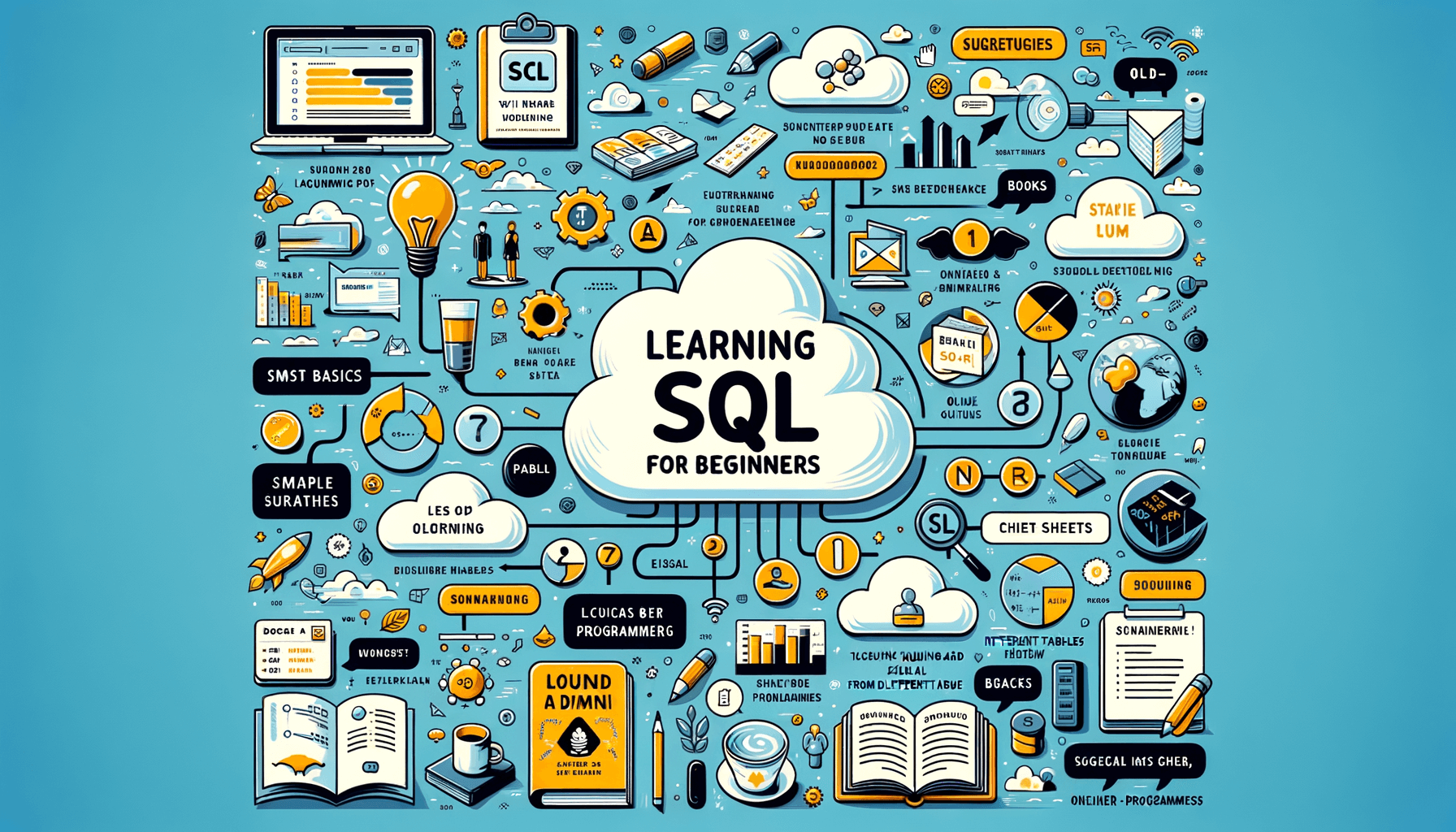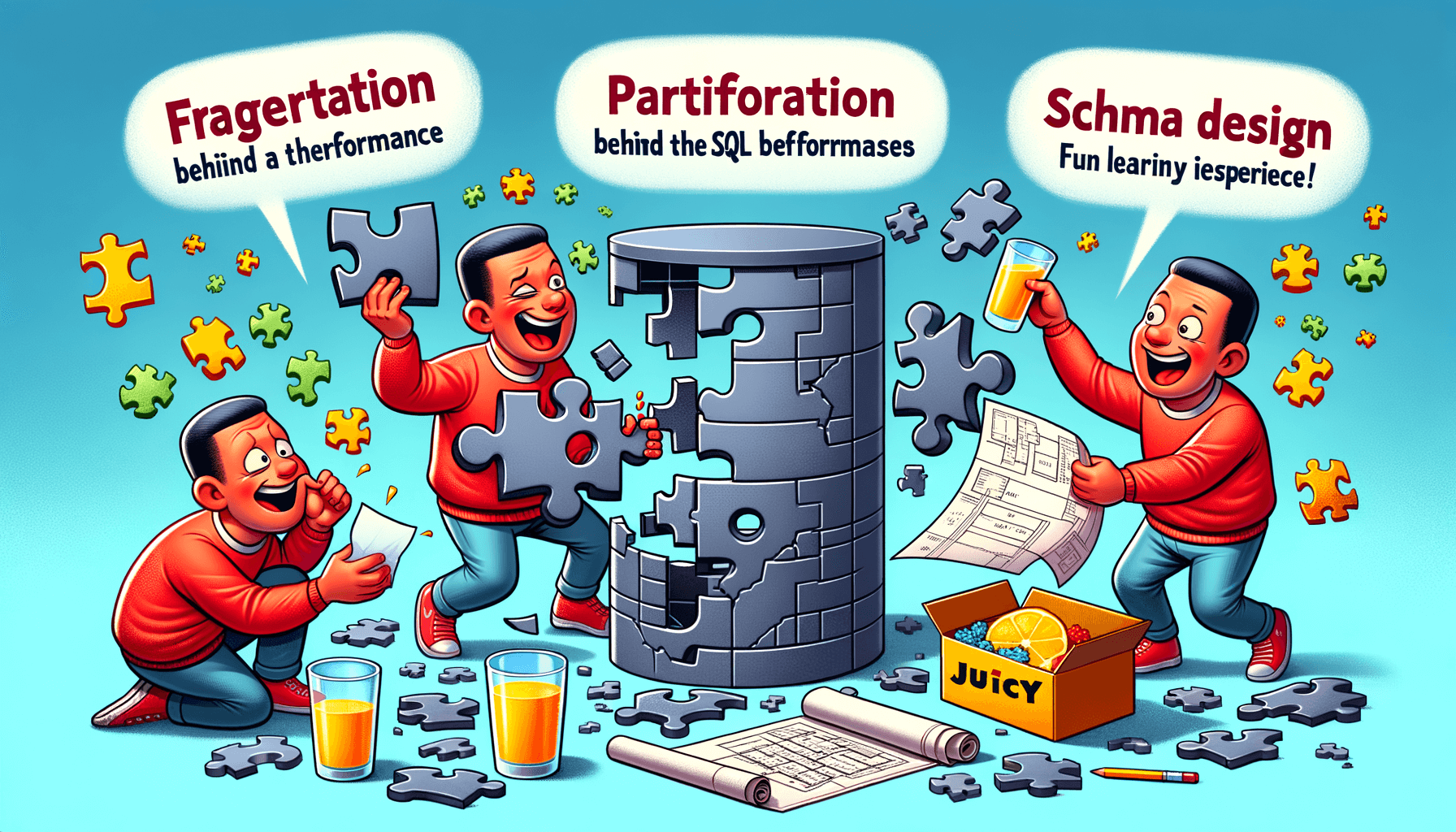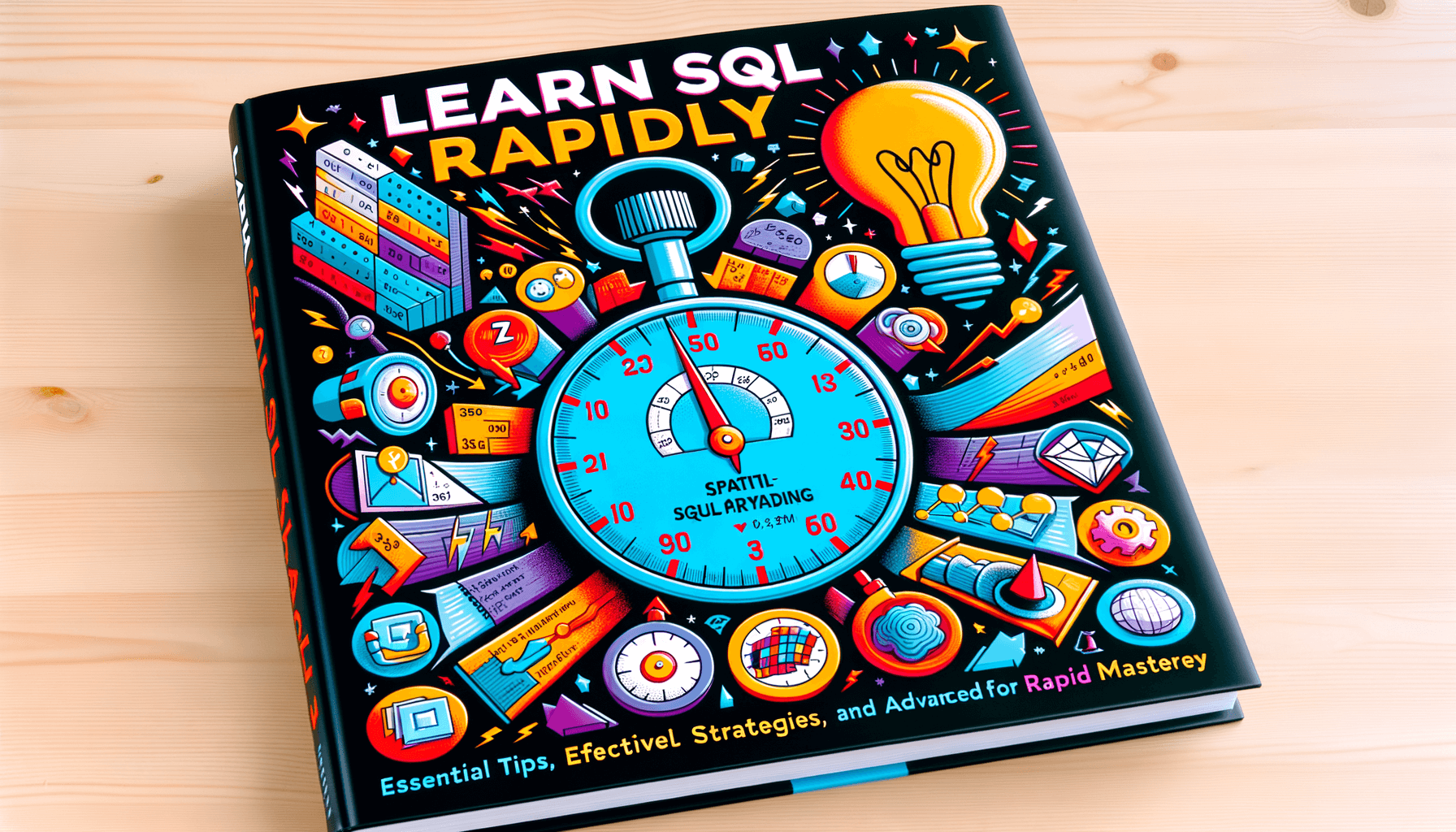A big variety of articles and resources

Can I learn SQL without any programming knowledge?
 Sia Author and Instructor
Learn SQL
Sia Author and Instructor
Learn SQL
12 minute read
Learning SQL might seem hard if you don't know any programming. But guess what? SQL is different from other programming languages. It's more like a tool to talk to databases. Even if you have no coding experience, you can still learn SQL. This article will show you how to get started and why learning SQL can be very useful.
Key Takeaways
- SQL is a special language for managing data in databases.
- You don't need to know other programming languages to learn SQL.
- There are many resources like online courses and books to help you learn SQL.
- Learning SQL can open up new job opportunities and improve your data skills.
- Beginners might face challenges, but with practice, anyone can learn SQL.
Understanding SQL and Its Importance
Definition of SQL
SQL, or Structured Query Language, is a specialized language used to manage and manipulate databases. It allows us to perform various operations such as querying data, updating records, and managing database structures. SQL is essential for anyone working with data because it provides a standardized way to interact with databases.
Role of SQL in Data Management
In the realm of data management, SQL plays a pivotal role. It enables us to store, retrieve, and manipulate data efficiently. With SQL, we can create databases, insert new data, update existing records, and delete unnecessary information. This makes it a powerful tool for maintaining the integrity and accuracy of data.
Industries Utilizing SQL
SQL is widely used across various industries. Some of the key sectors include:
- Finance: For managing transactions and financial records.
- Healthcare: To store patient information and medical records.
- Retail: For tracking inventory and sales data.
- Technology: In software development and data analysis.
Understanding SQL's importance across these industries highlights its versatility and necessity in today's data-driven world.
Fundamental Concepts of SQL
Basic SQL Syntax
Understanding the basic syntax of SQL is the first step in learning this powerful language. SQL statements are used to perform tasks such as updating data on a database or retrieving data from a database. Each SQL statement begins with a keyword, such as SELECT, INSERT, UPDATE, or DELETE, followed by the specifics of the task.
Common SQL Commands
There are several common SQL commands that we use frequently. These include:
- SELECT: Retrieves data from a database.
- INSERT: Adds new data to a database.
- UPDATE: Modifies existing data within a database.
- DELETE: Removes data from a database.
These commands form the backbone of SQL operations and are essential for managing and manipulating data.
Data Types in SQL
In SQL, data types define the type of data that can be stored in a table column. Common data types include:
- INT: Integer numbers.
- VARCHAR: Variable-length strings.
- DATE: Dates.
- BOOLEAN: True or false values.
Choosing the right data type is crucial for ensuring data integrity and optimizing database performance.
By mastering these fundamental concepts, you can fit data & SQL skills into your busy life with micro-courses. Master SQL basics, perfect for beginners, learn at your own pace. No credit card required. Login or sign up to start learning.
SQL vs. Traditional Programming Languages
Differences Between SQL and Procedural Languages
SQL, or Structured Query Language, is a domain-specific language used for managing and manipulating databases. Unlike traditional procedural languages like Python or Java, SQL is declarative. This means that in SQL, we specify what we want to achieve without detailing the steps to get there. In contrast, procedural languages require us to outline each step of the process.
Use Cases for SQL and Other Languages
SQL is primarily used for database operations such as querying, updating, and managing data. It's the go-to language for tasks involving large datasets and complex queries. On the other hand, traditional programming languages are more versatile and can be used for a wide range of applications, from web development to machine learning.
Learning Curve Comparison
When it comes to learning, SQL is often considered easier for beginners, especially those without any programming background. The syntax is straightforward, and the focus is on data manipulation rather than complex logic. Traditional programming languages, however, have a steeper learning curve due to their complexity and the need to understand various programming concepts.
Resources for Learning SQL
Online Courses and Tutorials
There are many online courses and tutorials that can help you learn SQL. Websites like Coursera, Udemy, and Khan Academy offer structured courses that cover everything from basic to advanced SQL concepts. These platforms often provide interactive exercises and quizzes to reinforce learning.
Books and Publications
Books are a great way to dive deep into SQL. Titles like "SQL for Dummies" and "Learning SQL" offer comprehensive guides that are easy to understand. These books often include examples and exercises to help you practice what you've learned.
Community and Support Forums
Joining a community or support forum can be incredibly helpful when learning SQL. Websites like Stack Overflow and Reddit have active communities where you can ask questions and get answers from experienced SQL users. These forums can provide quick solutions to problems and offer tips and tricks for more efficient learning.
Pro Tip: Engaging with a community can make learning SQL more enjoyable and less isolating. Don't hesitate to ask questions and participate in discussions.
Practical Applications of SQL
Database Creation and Management
In the world of data, creating and managing databases is a key skill. SQL helps us set up databases, define their structure, and manage the data within them. This includes tasks like creating tables, setting up relationships, and ensuring data integrity. SQL is essential for anyone looking to work with databases.
Data Analysis and Reporting
SQL is a powerful tool for analyzing data and generating reports. We can use SQL to query databases, extract meaningful information, and present it in a way that makes sense. This is especially useful in business settings where data-driven decisions are crucial. With SQL, we can turn raw data into valuable insights.
Integration with Other Technologies
SQL doesn't work in isolation. It often integrates with other technologies to provide a complete data solution. For example, SQL can be used with programming languages like Python or R for advanced data analysis. It can also work with data visualization tools to create interactive dashboards. This makes SQL a versatile tool in the tech world.
SQL is a versatile tool that can be used in many different ways, from managing databases to analyzing data and integrating with other technologies.
Challenges Faced by Beginners
Common Misconceptions
When starting with SQL, many beginners think it's just another programming language. However, SQL is more about managing and querying data than writing complex algorithms. Understanding this difference early on can save a lot of confusion.
Technical Difficulties
Beginners often struggle with setting up their first database. The initial steps, like installing database software and connecting to a server, can be daunting. It's crucial to follow step-by-step guides to avoid getting lost.
Overcoming Learning Obstacles
To overcome these challenges, we recommend breaking down the learning process into smaller, manageable tasks. Consistent practice is key. Joining online forums and study groups can also provide much-needed support and motivation.
Remember, every expert was once a beginner. Patience and persistence are your best friends on this journey.
Benefits of Learning SQL Without Prior Programming Knowledge
Accessibility for Non-Programmers
Learning SQL is highly accessible for those without a programming background. The syntax is straightforward and resembles natural language, making it easier to grasp. This simplicity allows non-programmers to quickly start querying databases and extracting valuable information.
Career Opportunities
Knowing SQL can open up numerous career opportunities. Many industries, such as finance, healthcare, and marketing, rely on data analysis. By learning SQL, you can qualify for roles like data analyst, business analyst, or even database administrator. This skill is in high demand and can significantly boost your employability.
Enhancing Data Literacy
Understanding SQL enhances your data literacy, enabling you to make informed decisions based on data. You can analyze trends, generate reports, and gain insights that are crucial for strategic planning. Being data-literate is a valuable asset in today's data-driven world, and SQL is a key tool in achieving that.
SQL Learning Strategies for Non-Programmers
Step-by-Step Learning Approach
We recommend starting with the basics and gradually moving to more complex topics. Learn SQL basics at your own pace to build a strong foundation. This method helps in understanding each concept thoroughly before moving on to the next.
Hands-On Practice
Practical experience is crucial. Engage in hands-on practice by working on real-world projects or using online platforms that offer interactive SQL exercises. This approach helps in mastering PostgreSQL performance and query optimization.
Utilizing Visual Tools
Visual tools can make learning SQL easier. Tools like SQL visualizers and database management systems with graphical interfaces can help you understand the structure and relationships within databases. These tools are especially useful for beginners who might find text-based commands intimidating.
By following these strategies, non-programmers can effectively learn SQL and apply it in various fields without needing prior programming knowledge.
Case Studies of Non-Programmers Excelling in SQL
Success Stories
Many people have gone from knowing nothing about SQL to becoming skilled users. One example is a marketing professional who took a course called "Zero to PostgreSQL Junior DBA: Complete Database Administration Course." This course helped them gain practical SQL skills with real-world problems, hands-on projects, and expert-led training. The effort required for success was significant, but the results were worth it.
Career Transitions
Another inspiring story is about a teacher who decided to switch careers. They started learning SQL to improve their data analysis skills. With dedication and practice, they managed to land a job as a data analyst within a year. This shows that even without a programming background, one can make a successful career transition by learning SQL.
Impact on Professional Growth
Learning SQL can also have a big impact on your current job. For instance, a sales manager used SQL to better understand customer data. This not only improved their sales strategies but also led to a promotion. SQL skills can open up new opportunities and enhance your professional growth.
These case studies show that with the right resources and dedication, anyone can excel in SQL, regardless of their background.
Future Trends in SQL and Data Management
Advancements in SQL Technology
SQL technology is always changing. New features and tools are being added to make it easier to use. For example, some platforms now offer better ways to handle big data. This helps us manage and analyze large amounts of information quickly.
Evolving Industry Demands
As industries grow, their needs change. More companies are looking for ways to use data to make better decisions. This means there is a higher demand for people who know SQL. We need to keep learning to stay up-to-date with these changes.
Preparing for Future Challenges
The future will bring new challenges in data management. We must be ready to face them. This includes learning about new tools and methods. By staying informed, we can be prepared for whatever comes next.
Staying current with SQL trends is key to mastering the basics at your own pace. No credit card required. Login or sign up to start learning. Create a new account for free.
The future of SQL and data management is evolving rapidly. To stay ahead, it's crucial to keep learning and adapting. Our website offers a range of courses designed to help you master SQL and other advanced technologies. Don't miss out on the opportunity to enhance your skills and advance your career. Visit our website today to explore our course catalog and find the perfect course for you!
Conclusion
In summary, learning SQL without any prior programming experience is entirely possible. SQL is designed to be user-friendly and is often the first step for many who are new to the world of data. With dedication and the right resources, anyone can master the basics of SQL. This knowledge can open doors to various opportunities in data analysis, database management, and beyond. So, don't be discouraged if you're starting from scratch; with patience and practice, you can become proficient in SQL.
Frequently Asked Questions
What is SQL?
SQL stands for Structured Query Language. It's a special language used to communicate with databases.
Do I need to know programming to learn SQL?
No, you don't need any programming knowledge to start learning SQL. It's designed to be easy to understand.
How long does it take to learn SQL?
The time it takes to learn SQL can vary. Some people can pick up the basics in a few weeks, while others might take a few months.
What can I do with SQL?
With SQL, you can create and manage databases, analyze data, and generate reports. It's very useful in many jobs.
Are there free resources to learn SQL?
Yes, there are many free resources online, including tutorials, videos, and forums where you can ask questions.
Is SQL used in many industries?
Yes, SQL is used in many industries like finance, healthcare, and technology. It's a valuable skill to have.
Can SQL help me get a job?
Yes, knowing SQL can open up many job opportunities, especially in data-related fields.
What is the difference between SQL and other programming languages?
SQL is used for managing databases, while other programming languages like Python or Java are used for building applications and software.
Related Articles

3 Juicy Secrets Behind Sluggish SQL!!
5 minute read

How Difficult Is SQL to Learn? A Comprehensive Guide
8 minute read

How to Learn SQL Fast: Tips and Tricks for Rapid Mastery
9 minute read




